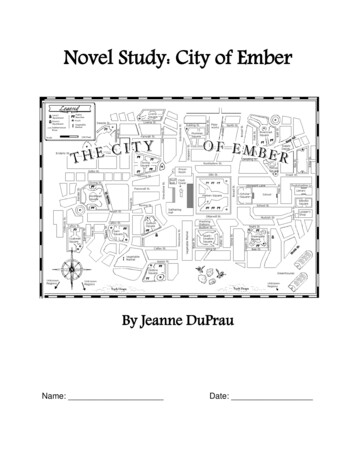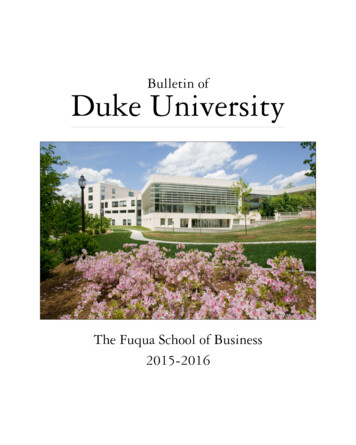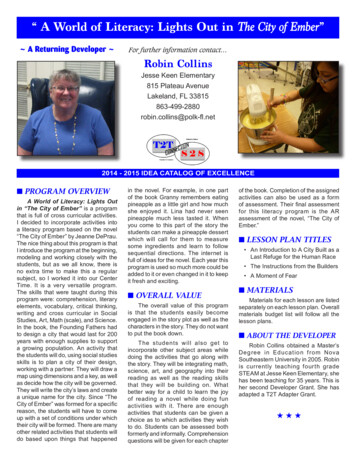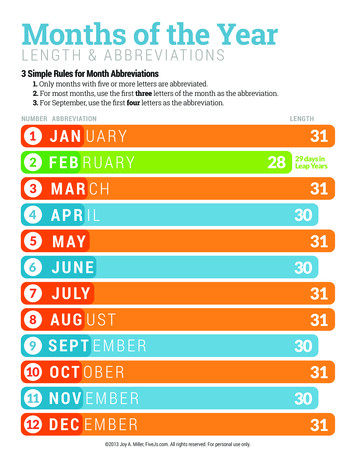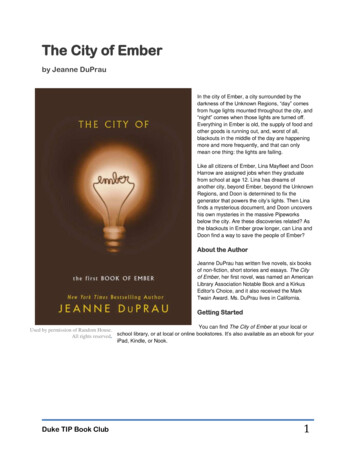
Transcription
The City of Emberby Jeanne DuPrauIn the city of Ember, a city surrounded by thedarkness of the Unknown Regions, “day” comesfrom huge lights mounted throughout the city, and“night” comes when those lights are turned off.Everything in Ember is old, the supply of food andother goods is running out, and, worst of all,blackouts in the middle of the day are happeningmore and more frequently, and that can onlymean one thing: the lights are failing.Like all citizens of Ember, Lina Mayfleet and DoonHarrow are assigned jobs when they graduatefrom school at age 12. Lina has dreams ofanother city, beyond Ember, beyond the UnknownRegions, and Doon is determined to fix thegenerator that powers the city’s lights. Then Linafinds a mysterious document, and Doon uncovershis own mysteries in the massive Pipeworksbelow the city. Are these discoveries related? Asthe blackouts in Ember grow longer, can Lina andDoon find a way to save the people of Ember?About the AuthorJeanne DuPrau has written five novels, six booksof non-fiction, short stories and essays. The Cityof Ember, her first novel, was named an AmericanLibrary Association Notable Book and a KirkusEditor's Choice, and it also received the MarkTwain Award. Ms. DuPrau lives in California.Getting StartedYou can find The City of Ember at your local orUsed by permission of Random ’s also available as an ebook for yourAll rights reserved.iPad, Kindle, or Nook.Duke TIP Book Club1
While You’re ReadingEvery good story is full of captivating characters, timeless and timely themes, significant settings, pivotal plot points,and vivid vocabulary that combine to engage our brains and our hearts. In this section of the website, you will findactivities that invite you to dig deeper into each of these literary elements for a better understanding and enjoyment ofthe book.To aid your investigation, save our Writing While You Read guide (see page 15), with helpful tips on keeping areading journal and annotating a book while you read.Reading Journal Prompts Look up “ember” in a dictionary. Reflect on why Jeanne DuPrau chose to name the city “Ember.” How well doesthat name fit the city it describes? As you read (or reread) the novel, look for other examples of “embers” in thestory. In the city of Ember, everyone is assigned a job by the luck of the draw at age 12. What strengths do you see inthis system? What are the weaknesses? Talk to your parents and grandparents about their jobs and the factorsthat influenced their career choices. What factors are influencing your thoughts about your own career? In Chapter 2, we learn some history about Lina’s and Doon’s friendship. In particular, Lina recalls an incidentwhen she and other children, including Doon, were trying to climb a lightpole. Reread this incident, and thinkabout what it tells us as readers about Lina and about Doon. Which character do you most relate to and why? While waiting in theReception Room to deliverthe message to the mayor,Lina has a chance to readfrom The Book of the City ofEmber. In one section, shereads, “The Gathering Hallclock measures the hoursof night and day. It mustnever be allowed to rundown . It is the job of thetimekeeper to wind the clockevery week and to place thedate sign in Harken Squareevery day” (34). But Linaknows that not alltimekeepers have beendiligent in their work, and as a result, no one in Ember can really be sure of the exact time, the day of the week,or the year. How important is time to you? What roles does it play in your life? How would you feel if you weren’tquite sure what time or day or year it was? What difference would that uncertainty make in your life?Duke TIP Book Club2
After the long blackout, the mayor calls a town meeting to provide all citizens with “important information.”The mayor tells the people of Ember that the difficulties are “slight,” that the people need to be patient, andthat solutions are being found. He urges them not to panic. Why do you think the mayor chooses thisapproach, rather than talking more directly to the people about the problems the city is facing? How doesthis approach help the mayor? How does it hurt him in the eyes of the people? How do the mayor’s wordshelp the people? How do they hurt them? Have you ever had an experience when someone told you thingswere better than you knew they were? How did that make you feel? After the Town Meeting, Doon says, “It makes me so angry the way he talks to us” (88). Doon’s father thensays, “The trouble with anger is, it gets hold of you. And then you aren’t the master of yourself anymore.Anger is” (89). Are there other characters in the novel that aren’t their own masters? What is controllingthem? Think about things in our world that can “get hold of” people, that can become a “master.” What arethe consequences of being controlled by something like anger or some other “master”? Doon’s father then begins a statement that we can assume Doon has heard before: “And when anger is theboss, you get .” Doon finishes the statement: “Unintended consequences” (89). If you read TheApothecary and worked through the book club activities, this concept should be familiar to you. As you readthe novel, look for examples of unintended consequences. In The City of Ember, Jeanne DuPrau uses similes (comparisons of two things using “like” or “as”) andmetaphors (figures of speech in which you use one object or idea for another to suggest similarity betweenthe two objects or ideas) to make the story more vivid and enjoyable for the reader. “She runs like the wind”is an example of a simile, and “He’s a monster on the basketball court” is an example of a metaphor. WhenLina recalls her father’s illness, she uses two similes: “ he seemed to grow dim like a lamp losing power,and the sound of his breathing was like water gurgling through a clogged pipe” (134). What do you noticeabout these particular comparisons? Why does Lina compare her father to a lamp losing power, or hisbreathing to water in a pipe? Look for other examples of similes and metaphors in the novel, and write themdown in your Reading Journal. For each one, write down your thoughts about why the character (and theauthor) used that particular comparison. Many characters in thisnovel are searching for something.As you read (or reread) the novel,look for examples of this searching.How are these characters’ searchessimilar to and different from oneanother? Also pay attention to theimagery—particularly the repeatedreferences to doors and thecontrasts between darkness andlight—that DuPrau uses throughoutthe novel. How do those imagesrelate to this important idea ofsearching?Duke TIP Book Club3
After a significant event near the middle of the novel, Lina feels “as if she ha[s] suddenly gotten older” and is“a sort of mother herself now” (143). The City of Ember is, among other things, a coming-of-age story—astory that traces the growth and development of the main character, or protagonist, from childhood toadulthood. As you read or reread the novel, look for examples of Lina’s coming of age. How is she growingand changing in this story? How is she different in the end of the novel than she is in the beginning? The Singing is a significant holiday in the city of Ember. Reread chapter 16, which describes the variouselements of the Singing. Considering those different elements, and the role they play in the Singing, wouldyou call this event a “celebration”? If so, what is being celebrated? If not, what type of holiday is it? How isthe Singing similar to holidays that you celebrate or remember? What holiday do you celebrate that is mostlike the Singing? “‘Curiosity,’” [says] the mayor. ‘A dangerous quality. Unhealthy. Especially regrettable in one so young’”(217). Write down your reaction to the mayor’s comment. Why does he feel this way? He’s not alone in histhinking. Have you ever heard the expression, “curiosity killed the cat”? What are the positive elements andresults of curiosity, both in the novel and in your world? Can you think of other books or movies in whichcuriosity plays an important role? Is curiosity a positive thing or a negative or both in those stories? Many popular novels for young people and adults are coming-of-age stories. What other books have youread that fit the coming-of-age description? In what ways are those novels similar to The City of Ember? Inwhat ways are they different? The City of Ember is also a post-apocalyptic (from apocalypse, meaning “widespread destruction”) novel,imagining a world after some catastrophic event. Can you think of other post-apocalyptic stories that you’veread or seen in film? What do those stories have in common with The City of Ember? How are theydifferent? Why do you think these kinds of stories are so popular?Duke TIP Book Club4
Getting to the RootEnglish is a living language. It changes and grows all the time. One of the best ways to understand the history of theEnglish language and to unlock the meanings of unfamiliar words is to learn Latin and Greek word parts. As youstudy biology, you will learn more and more of these word parts, and once you know them, you will begin to recognizethem in all kinds of words—and you'll find that your knowledge of those word parts will help you decipher themeanings of unfamiliar words.Roots are the "base" of plants, and Latin and Greek roots form the base of many English words. For example, theLatin root audi means “to hear.” How many modern English words can you think of that include the root audi?Next, take a look at each root below. Beside each root is a word containing that root.Next, take a look at each root below. Beside each root is a word containing that root. micro—microscopic pre—prefix phone—microphonetele—television1.2.Can you determine the meaning of the root from your knowledge of the word beside it?If not, think of other words that you know that also contain that root. What do those words have in common?3.Based on that common element, can you figure out the meaning of the root?If you're still stumped, check out this list of Latin and Greek roots.4.5.Now that you know the meaning of the root, how many words can you generate that use the root?Once you understand the meaning of the root, you'll find that even your understanding and appreciation offamiliar words will deepen and grow when you think about how that root works in those words.Duke TIP Book Club5
Words, Words, WordsBelow is a list of words from The City of Ember that may be unfamiliar to you, along with the page number on whicheach word appears in the story. vast (7)lumbered (7)labyrinth (11)ochre (22)jostled (100)illegible (103)egress (171)threshold (186)curtly (200)unfurled (215)impudence (218)tumult (224)disperse (230)thrashing (239)feeble (251)gully (265)chasm (270)Before you look these words up in a dictionary—or ask someone what they mean—try working through thefollowing steps:1. Generate a list of other words that share one or more of the same word parts. What do the words on the listhave in common? Are there any clues from those commonalities that you can use to help figure out themeaning of the unknown word? Hint: Some word parts—as they appear in English words—have multiplemeanings as we look back at the Latin and Greek, in part because of changes that have occurred in the wordsover the years. For example, does the "ped-" in "pedestrian" mean the same thing as the "ped" in2."pediatrician"? Where there is possible confusion, context clues (see step 2) are extremely important.Go back and reread the word in its context. This context includes the sentence in which you find the word, butyou should also read one or two sentences both before and after the appearance of the word. What contextclues do you find that might unlock the meaning of the word for you?3.4.Make your best guess at the meaning of the word.Look up the definition in a dictionary. Be sure to also look for information about the word's origin. This5.information will often contain the Latin or Greek word from which the word is derived.How close was your guess?Duke TIP Book Club6
ExploreOur world is full of connections—between people, places, and events. In this section of the website, you will findactivities that explore some important connections—in science, the history of science, and economics—between TheCity of Ember and our world!Exploring ElectricityWhen you flick a light switch, turn on your computer, or plug your iPad charger into the outlet, you probably don’t giveit much thought. Electricity is such an important part of our lives that we usually take it for granted, until a stormknocks out the power! Electricity may be even more critical in the underground city of Ember, where it provides theonly source of light. Think about how different a power outage is in the middle of the day and after the sun goesdown.Activities Want to learn how electricity works? Check out this link from howstuffworks.com to get started. A generator is a critical part of an electrical system, and Ember’s generator is almost a character in thenovel. Now that you understand the basics of electricity, learn how a generator works. On his first day of work, Doon asks how the generator works, the old man from the generator room says, "AllI know is, the river makes it go" (48). In our world, we know that rivers generate electricity around theworld. Learn more about hydroelectric power, and review some facts about the Grand Coulee Dam, thelargest hydroelectric power plant in the United States, and the Hoover Dam. The largest hydroelectric damsin the world are the Itaipu Dam, between Brazil and Paraguay, and the Three Gorges Dam in China. Interested in learning more? Research pioneers in the study of electricity.Duke TIP Book Club7
Economics in ActionElectrical power isn’t the only thing that is running low in the city of Ember. Certain foods haven’t been seen in ages,and now, necessities like light bulbs are in short supply. Under these circumstances, we can see some basicprinciples of economics (the study of how individuals and communities manage resources to make, buy, and sellproducts and services) at work.Read (or reread) Chapter 5, “On Night Street,” and then complete the following activities.Activities Learn about the economic principle of scarcity. Where do you see examples of scarcity in this chapter? Howdoes scarcity influence Lina’s choices? Have you ever said to your parents, “I need a new Xbox game”? Have you ever “needed” the latest book inyour favorite series, or a new outfit with the latest brand name, or the latest and greatest cell phone? Learnabout the differences between wants and needs. Does Lina have these two confused? The man in the shop tells Lina the price of each colored pencil is five dollars. Why is the price so high? Learnmore about the economic principles of supply and demand to find out. Based on what you've learned about supply and demand, what would you expect to happen to the price of.1. .roses in February?2.3.gasoline in June?.heating oil in August?4.oil when there is thethreat of war in a major5.oil-producing country?.flat screen TVs tenyears after the firstmodel came on the6.market?. oranges after a late7.freeze in Florida?.a mobile phone whenthe news breaks thatthe batteries cause8.fires?.corn for food whenmore corn is used tomake an alternative to gasoline? Ask a parent or teacher for other examples of the impact of supply and demand on prices in the real world. Arethere situations in which the supply, the demand, or the price seems to move in a different direction than youmight expect? Why would that be?Duke TIP Book Club8
CreateAn important part of learning is having the chance to produce something of your own. In this part of the website, youwill find engaging projects that connect with the novel and that allow your creative abilities to shine!"The main thing.is to pay attention," Doon's father tells him. "Pay close attention to everything, notice what no one else notices. Thenyou'll know what no one else knows, and that's always useful" (51). Paying careful attention, observing the worldaround you, is an important habit and skill to develop, whether you want to discover a cure for cancer or write thenext great American novel.Focusing on something you're excited about is a great place to begin to develop your own skills of observation. Doonis "fascinated by bugs," and he records "his observations about them in a book" with pictures on the left side anddescriptions of each bug's activity on the right (52). Select something - a plant or bug, for example, or a set of somethings - a specific part of your yard, or a garden,for example - to observe, and commit to regular observations (the same time(s) of day, every day) for a specificperiod of time. This time period may vary depending on the subject of your observation. Be sure to picksomething in which you're interested. Decide how you will document your observations. Will you make your own book, like Doon? If so, find a nicenotebook or journal, give it a title, and decorate the cover. If that approach is too low-tech for you, create adigital log on your computer or tablet or you might choose to record your observations with images that yousave in a digital album. Whichever digital approach you take, you can still come up with a creative file name andcreate a cool cover. Determine what you will record. Be sure to include observations of factors, like the weather or food, that mightbe influencing your subject(s). How will you organize your observations? Will you have one page per day? Will you draw pictures, takephotographs, or try to capture everything in words? Don't forget to pay attention! Look for how your subject(s) are growing, changing, and interacting with eachother and with the environment. Note changes from day to day, but also compare your observations over longerperiods of time, like from one Monday to the next. At the end of your observation period, review the entire journal or log, and reflect on what you've learned.Record those reflections, pick something else to pay attention to, and apply what you've learned to the nextround of observation.Duke TIP Book Club9
How-To 101Have you ever had difficulty following instructions? Maybe you were trying to build a Lego Deathstar, or maybe youwere baking a cake. Maybe you were trying to set up your avatar in a game, or perhaps you were building a treehouse. Or, most entertaining of all, perhaps you were watching a parent try to put something together - do dads everread instructions?If you have ever had difficulty following instructions, imagine if you had to bake a cake without knowing what an "egg"is! Try building a tree-house without knowing what this strange thing, "hammer" does. That's the situation Lina andDoon find themselves in when they finally reach the hidden storage room with boxes of mysterious things like"candles" and "matches."ActivityFor this activity you're going to put yourself in the shoes of the Builders who were leaving the instructions. Think of a process that you know how to do and that involves multiple steps, but that someone you know maybe friends or parents - wouldn't know how to do. It will be a bonus if items needed to complete the processare unfamiliar to your friends or parents, - like the candles, matches, boats and paddles are to Lina and Doon inthe novel. Create a set of detailed written instructions - visual instructions would make it too easy to demonstrate the usesof the unfamiliar things! - to be followed to accomplish the task. Remember that you will need to explain not onlythe process itself, but also the purposes and functions of any required "tools." Give your instructions to your friends or parents and observe. Are they able to follow your instructions? Wheredo they have difficulty and why? Does working together as a team make it easier for them? For an extra challenge, tear up the instructions, and make sure some portions are missing when they are putback together. Then see how well your friends or parents can decipher and follow your instructions!Everybody's a CriticWe're all familiar with great books, from the Harry Potter series to Harriet the Spy, being the basis for movies,and The City of Ember is no exception. With your parents' permission, watch the movie version of City ofEmber (available through Amazon, Blockbuster, Netflix or other services). After you've watched the movie, play moviecritic and write a review of the film. As you're working on your review, here are a few tips to keep in mind. The purpose of a review is to help your audience determine whether they would enjoy the movie or not. Give an outline of the story, but be careful not to provide "spoilers" that will give away too much information to your audience.Provide your opinion of the movie, and support that opinion with references to specific scenes or elements likeacting, lighting, music, sets, or costumes. This supporting information will help your audience determine if theywould likely share your opinion or not. Identify the ways in which the movie differs significantly from the book, and provide your opinion as to whetherthose differences improve the book's story or make the story less interesting.Duke TIP Book Club10
Read your review several times to make sure you have expressed your ideas clearly, supported them witheffective examples, and used proper spelling and grammar. Look for a way to publish your review. Possibilities may be a class or school newsletter, a bulletin board in yourschool or public library (with permission, of course), or simply sharing it with friends who haven't yet seen themovie.If you're interested in television and film yourself, use your written review as a script for an on-camera review. If yourecord a video review, look for ways to distribute it. Again, check with parents, teachers, or librarians about ways touse the review in school eNewsletters, daily student news broadcasts, or on the school's website. Who knows? Thisreview might be the first installment in a regular series that could help other students and friends pick movies they willenjoy and avoid ones that they won't!Duke TIP Book Club11
Reflect & Connect PromptsIn Duke TIP’s online Book Club, the “Connect” prompts provide an opportunity for students to share their ideas aboutthe book with other Duke TIP students. You may choose to record your responses to these questions in your ReadingJournal, or you can use them to talk about the book with friends or classmates who have also read it.Help Wanted?In our world, people looking for a job used to respond to "Help Wanted" signs and now review online job postings oronline networks like Linkedin. In the city of Ember, no one has to look for a job because everyone is assigned one atage 12. When Lina and Doon receive their assignments, they have very different ideas about which jobs areimportant and which are useless. Lina thinks being a messenger is perfect because they connect "everyone toeveryone else" and because she loves to run (16). Considering what you love to do and what you consider to beuseful and important, what would your perfect job in the city of Ember be? Why? What about in your hometown?Enough is Enough – Or Is It?In The Book of the City of Ember, Lina reads, "The citizens of Ember may not have luxuries, but the foresight of theBuilders, who filled the storerooms at the beginning of time, has ensured that they will always have enough, andenough is all that a person of wisdom needs" (34). One wise person, Socrates, put it this way: "He who is notcontented with what he has, would not be contented with what he would like to have.” Do you agree with the Buildersand with Socrates' quote? Why or why not? How do you know when "enough is enough"? What makes something a"luxury" and what makes it a "necessity"? How do you determine the difference between a want and a need? (Seethe Uncover section for more information on wants and needs.)Responsibility or Reward?Doon's father frequently tells him, "You're a good boy and a smart boy. You'll do grand things someday, I know youwill." Doon ".ache[s] to do something important, like finding the secret of electricity, and, as his father watche[s], berewarded for his achievement" (50). Doon's father's quote suggests that there is a connection between having a strength, like intelligence, and bothan ability and a responsibility, to do "grand things" with that strength. Do you agree? Share your favorite example of someone who did something "grand."Sometimes we do things because we feel like we have to - we have a responsibility or duty to do them. Othertimes we do things because of what we will get - there is some kind of reward or recognition waiting for us at theend. Is responsibility or reward a more powerful motivator for you? Why? Doon says he wants to save the city, but he also wants to be recognized for his efforts in Harken Square. Basedon the rest of the book, is responsibility or recognition a more powerful motivator for Doon?When Life Gives You Lemons After his first day of work, Doon's father tells him, ".it sounds unpleasant, I have to admit. But the Pipeworks isyour assignment, no way around it. What you get is what you get. What you do with what you get, though.that'smore the point, wouldn't you say?" (51). Doon's father's advice sounds like some other famous statements you mayhave heard: "bloom where you are planted," or "When life gives you lemons, make lemonade." Are these statements good advice? Why or why not?How do they relate to some of the other ideas in the novel?Share some examples of characters in the novel who make the most of their "unpleasant" situations.Can you think of examples of characters who "get" something pretty good (in other words, they have a bettersituation than others), but who do some unpleasant things?Duke TIP Book Club12
Share a time when you have made "lemonade" out of a "sour" situation. What did you learn from theexperience?The Final Frontier?Lina tells Clary, "In my mind, I see another city. It isn't like Ember; it's white and gleaming. The buildings are tall andsort of sparkle. Everything is bright, not just inside the buildings but all around them, too, even up in the sky. I knowit's just my imagination, but it feels real. I think it is real." When Clary asks about this city's location, Lina says, "That'swhat I don't know. Or how to get to it. I keep thinking there's a door somewhere, maybe out in the Unknown Regions a door that leads out of Ember, and then behind the door a road" (68-9).Like Christopher Columbus, Sacagawea, and Yuri Gagarin, Lina possesses the impulse to explore, the powerfulbelief that there is more than meets the eye, that there is something else "out there." Why do you think the impulse to explore the unknown is so powerful for some people? What is it that we'relooking for? What other characteristics does an explorer need? Does Lina have those characteristics?What are the benefits of exploration? What are the dangers?How does this impulse for exploration relate to Doon's father's advice to "do with what you get"?Turning on the LightFor Lina, "[t]aking hold of a pencil [is] like opening a tap inside her mind through which her imagination flow[s]" (135).What is your "pencil"? What is it that opens the tap or turns on the light of your imagination? For Lina, the results arepictures. What is it that you create?Finders, Keepers?When Lina realizes that Lizzie has been getting pineapple, fruit cocktail, peaches, applesauce, and other longforgotten treats from Looper, Lina asks, "But Lizzie, why should you get all that? Why you and not other people?"Lizzie's response? "Because we found it. Because we can get at it." When Lina says it's not fair, Lizzie offers hersome of the goods too, but that's not Lina's problem. Lina thinks it's unfair "that just two people [are] getting thingsthat everyone.want[s]. She [can't] think how it should.be done. You [can't] divide a can of applesauce evenlyamong all the people in the city. Still, something [is] wrong with grabbing the good things just because you [can]"(153). Do you agree with Lina? Is what Lizzie and Looper are doing unfair? Or should "finders, keepers" apply? Whyor why not? When things are scarce, who should decide who gets them? How should that decision be made?If you were in charge of the storerooms in Ember, how would you decide how to distribute these items?Ending or Beginning?SPOILER ALERTThese questions, and the responses to them, will be focused on the end of the novel, so if you haven't finishedreading yet, turn back now!The ending of the novel reveals a great deal of new information that changes how we understand what has comebefore and that sets up the next book in the series, The People of Sparks.Duke TIP Book Club13
Were you surprised by the ending? If not, what clues can you point to that led you to expect an ending likethis? Did the ending satisfy you as a reader, or did the fact that it opens the door to the next book, while leaving somany questions from this book unanswered, leave you frustrated? After reading The City of Ember, do you want to read The People of Sparks? Why or why not?Keep ReadingA few thoughts on books and reading."When I have a little money, I buy books; and if I haveany left, I buy food and clothes."—Erasmus"I cannot live without books."—Thomas Jefferson"Outside of a dog, a book is man's best friend. Inside of adog it's too dark to read."—Groucho MarxWhat's next?We hope that you enjoyed reading The City of Ember, byJeanne DuPrau. Check your email for information aboutour next book club selection. In the meantime, if you are looking for a new best friend—and aren't inside a dog—hereare some books you might enjoy, including the next books in the Ember series. Don't forget to use the tips fromWriting While You Read (see page 15) to
mean one thing: the lights are failing. Like all citizens of Ember, Lina Mayfleet and Doon Harrow are assigned jobs when they graduate from school at age 12. Lina has dreams of another city, beyond Ember, beyond the Unknown Regions, and Doon is determined to f


